What's ailing UD? Hens hopes football investments, Carty hiring make winning a habit again
- Oops!Something went wrong.Please try again later.
Chrissi Rawak arrived as University of Delaware athletic director in May of 2016 and admired those familiar-looking football helmets and quickly learned of the Blue Hens’ historic success.
They’d won six national championships at their level and been an NCAA Tournament regular, but were in the midst of their longest postseason drought.
Delaware couldn’t even contend for a Colonial Athletic Association title when Rawak arrived from Michigan.

“That was one of the things that was clear to me on my first visit that I wondered,” Rawak said recently. “Why are we not winning?
“And then when you look under the hood of the Cadillac, you’re like ‘OK, now I understand.’ The investment that we really needed to have in order to compete …
It wasn’t there, Rawak realized.
Delaware had been relying on its winning tradition, large fan base and football notoriety.
It had not, she felt, provided the infrastructure that, in the 21st century, was necessary to be among the elite in the NCAA’s Division I Football Championship Subdivision (FCS).
Expectations of coaches, players, fans and media were as grand as ever. Every preseason began with the stated goal of Delaware competing for a national championship.
But the tools needed to actually achieve that were not in place.
“We were not investing at a level and having the resources tied to our program to be able to produce that,” Rawak said. “That was not happening. Facilities, number of coaches, some of the support staff.”
At the same time, on-field performance shows Delaware, which hasn’t won more than seven games in a season since 2010 and has fired three coaches in that span, also didn’t have the players and accompanying direction that success demands.

Recent facility and financial improvements and Friday’s hiring of UD graduate Ryan Carty as coach are the latest attempts to alter that trend. Carty was officially introduced Monday.
“The way that people feel about this program, I can certainly relate,” Carty said, “because I feel the same way.”
Carty, 38, was a backup quarterback at Delaware from 2002 through 2006, serving as a team captain his senior year. He then went into coaching, spending 11 years at CAA rival New Hampshire and the past four at Sam Houston under ex-Delaware coach K.C. Keeler. He has been an offensive coordinator and quarterbacks coach for the past 10 seasons, regularly employing explosive and cunning systems of attack.
“The people I’ve talked to have absolutely been all in behind Ryan Carty,” said Russ Crook, a member of the Blue Hen Touchdown Club fan group. “He brings a tremendous amount of experience in high-powered offenses from winning programs and he’s gonna bring that back to us.’’
Few can match UD facilities in FCS
From a facility standpoint, the construction of the Whitney Athletic Center on the renovated west side of Delaware Stadium is the most obvious sign of how Delaware football has been upgraded since Rawak’s arrival. Its state-of-the-art weight-training, medical and academic-support facilities benefit all UD athletes, not just football players.
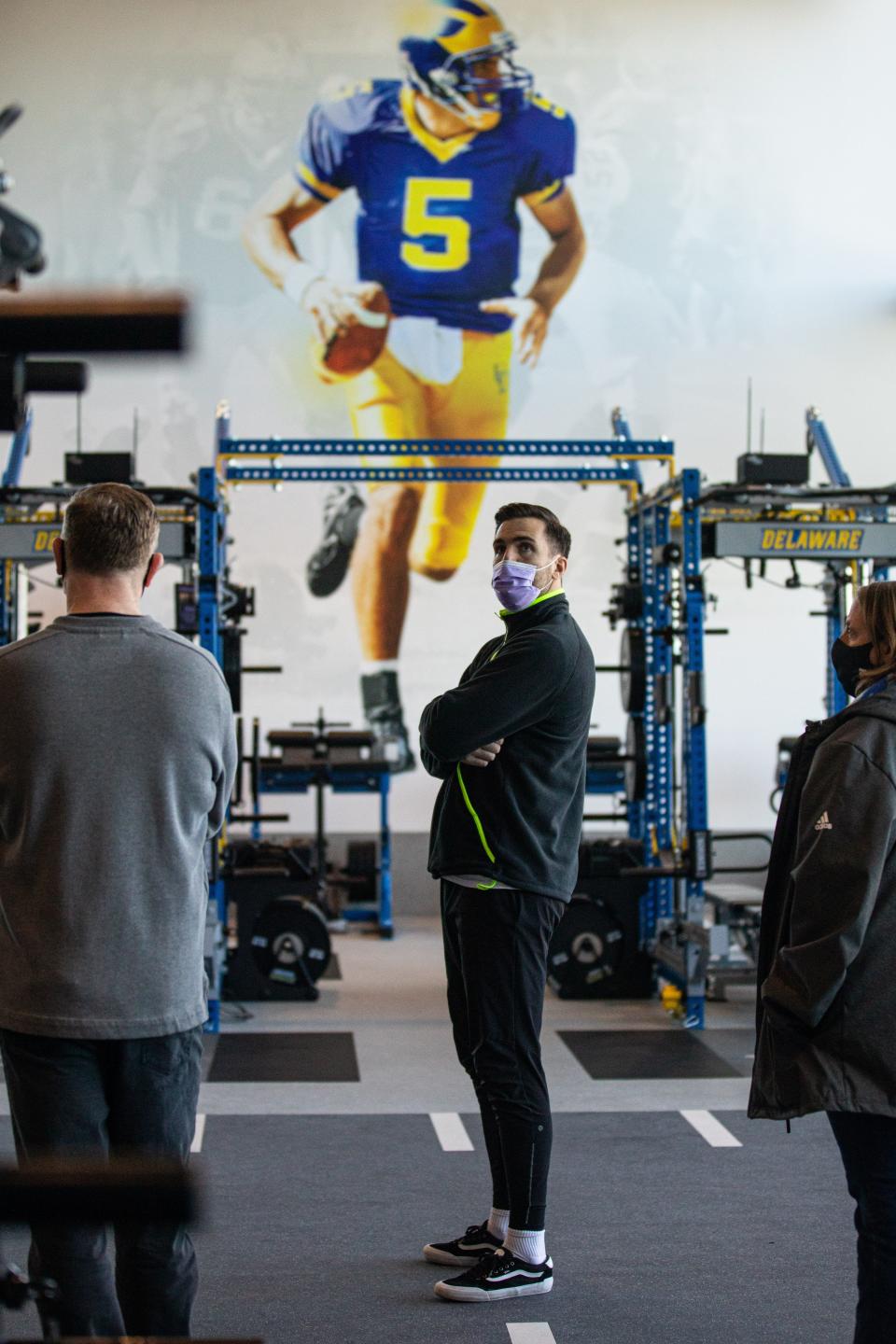
That $60 million transformation, which included $25 million supplied by the university and $35 million in public donations, was a major upgrade.
Other improvements have come in the way of equipment enhancements, support staff and summer access. Delaware’s spending on football went from $6.5 million in 2016 to $7.6 million in 2017, according to the Knight Commission College Athletics Financial Information Database. It has held steady since according to U.S. Department of Athletics Equity in Education data.
The Delaware Field House also provides an indoor practice facility few can match in FCS. Future plans are for that building to be completely renovated and become the UD football hub.
Delaware has typically been among the top spenders in FCS football, though it needed to increase and be more mindful of where those dollars went.
It has not, however, been among the biggest winners for the past dozen years.
“If you really wanna be a legitimate contender for national championships here, which we do, then this is what was necessary,” Rawak said.

Rawak fired Dave Brock as coach midway through the 2016 season – his Delaware teams had gone 19-22 – and after that season hired Danny Rocco, who’d had success at Liberty and CAA rival Richmond. Rocco had a sterling record of success at places with significantly fewer resources than Delaware.
It nearly paid off in the spring of 2021, when football was played at the FCS level after COVID-19 prevented a fall 2020 season.
Delaware went unbeaten during the regular season and reached the semifinals of the FCS playoffs before losing at South Dakota State. The 7-1 finish seemed a sign Delaware had regained the national stature it once enjoyed.
But the Blue Hens couldn’t maintain that momentum in the fall. Undermined by injuries to quarterback Nolan Henderson and other key players, they went 5-6 overall and 3-5 in the CAA.
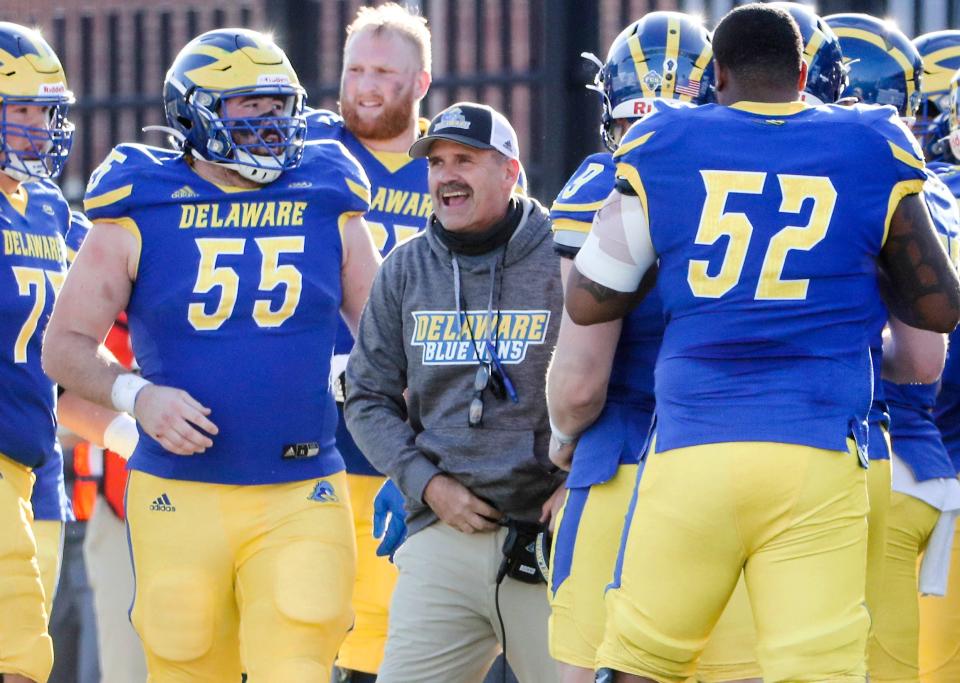
Rocco, who was CAA spring Coach of the Year and placed third in the national Eddie Robinson Award coach of the year voting, was fired Nov. 29. He’d gone 31-23 overall and 20-16 in CAA games in five seasons as Delaware coach and had also ended Delaware’s agonizing seven-year playoff absence in 2018.
But that wasn’t good enough at Delaware, which hadn’t won more than seven games in a season under Rocco and, Rawak pointed out the day of Rocco’s ouster, had gone 1-7 versus rivals Villanova and James Madison.
Winning has been expected since 1940s
Winning has been the custom and, hence, the expectation since Bill Murray came to Delaware from Duke in 1940 and promptly launched the Blue Hens on a 32-game unbeaten streak that featured the 1946 small colleges national title, determined in a wire-service poll.
Successor Dave Nelson continue that tradition beginning in 1950, introducing the Delaware Wing-T offense to befuddled defenses and dazzled audiences and winning a 1963 national title.
Tubby Raymond’s teams then further etched Delaware into the national football limelight, winning 1971 and ’72 wire-service national titles and the 1979 NCAA Division II version. His teams won at least eight games in 23 of his 36 seasons as coach from 1966-2001, with Raymond’s final victory making him college football’s ninth 300-game winner.
Under his successor, the former UD linebacker Keeler, Delaware surpassed seven wins in its four playoff seasons during his 2002-12 tenure, which featured the 2003 NCAA title and 2007 and 2010 runner-up finishes.
But Delaware has not surpassed seven wins in a season since going 12-3 in 2010. In fact, Delaware’s record since then is a mediocre 64-58 overall and a woeful 40-44 in CAA games.
Some blame Keeler’s January 2013 firing after 7-4 and 5-6 seasons for Delaware’s downfall. There was significant fanfare to see Keeler, Sam Houston’s coach since 2014 and the first coach to win FCS titles at two schools, brought back to Delaware after Rocco’s ouster.
He seemed to fit the bill for what Delaware was seeking. Any interest Delaware decision-makers had in possibly bringing Keeler back, however, was disallowed by school higher-ups who didn’t feel it was appropriate, Delaware Online/The News Journal has learned.
Delaware then hired his top offensive lieutenant in Carty.
“[Patrick] Harker, [Eric] Ziady and Brock are all responsible for setting the program back,” said longtime UD fan Ed Kowalczyk, referring to the president (Harker) and athletic director (Ziady), who fired Keeler and hired Brock.
That theme was echoed by John Cawley, the former Christiana High quarterback who has attended all but seven home games since 1969.
“I think the program has suffered not only from some less than desirable head coaching choices,” he said, “but the alignment with the head coaches to the athletic director to the president and board of trustees, and that’s extremely critical today.”
In hiring Carty, Delaware settled on a young coach with a proven background in offensive football, an area where Delaware has floundered of late, who also has important UD connections.
“This Blue Hen family matters to me,” Carty said.
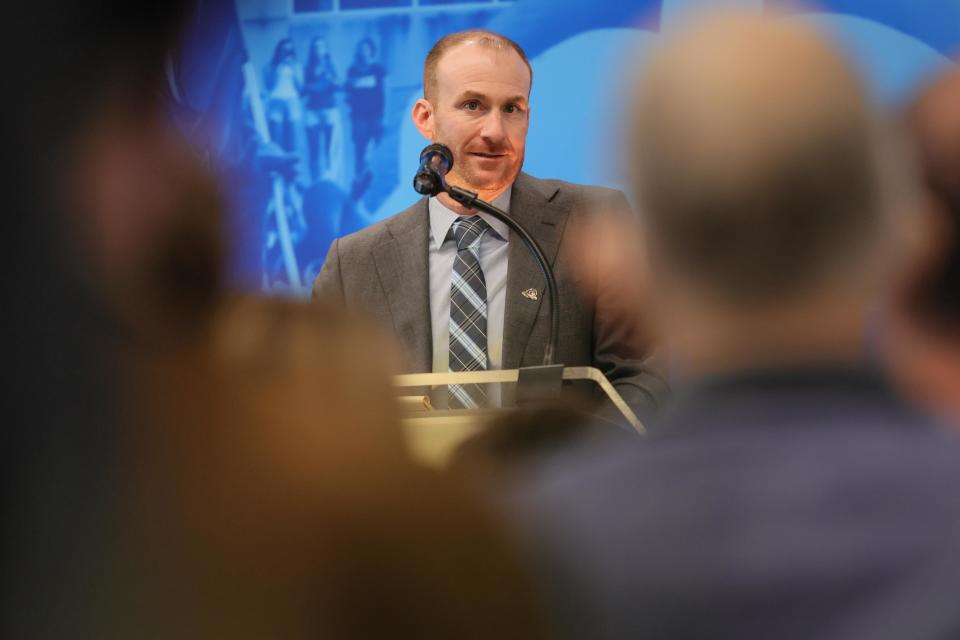
Delaware was once renowned for its offensive wizardry during its Wing-T days. It also had some prolific years under Keeler with quarterbacks Andy Hall, Joe Flacco and Pat Devlin operating his no-huddle spread attack.
But Delaware has finished in the top five of CAA total offense only once since 2010, and that was in the 2021 spring season. In the recently completed fall season, Delaware was 11th in the CAA averaging 299.8 yards per game.
Longtime UD fan Robert Kunicki cited “the lack of recruiting from FBS teams since Keeler was fired” as the main reason for Delaware’s subsequent downfall.
Each of Keeler’s four playoff teams featured an FBS-transfer at quarterback – Hall (Georgia Tech); Sonny Riccio (Missouri, 2004); Flacco (Pitt); and Pat Devlin (Penn State).
Bowling Green transfer Trent Hurley also had some success as Keeler’s last and Dave Brock’s first quarterback. Delaware had other FBS transfer quarterbacks since, but none were either able to win the starting job or hold it once they did.
“Keeler’s formula was about getting a top-notch quarterback from FBS and the offense fell in line,” Kunicki said.
Only victories will bring back fans
Carty is also well-versed in Blue Hen expectations and the importance of fostering relationships with fans, ex-players and other alumni. Those are bonds that need repair.
The evidence comes from home attendance numbers, which averaged 12,844 in 2021. That was Delaware’s lowest since 1968 (10,810) and nearly 10,000 below the record 22,280 in 2004.
“National championship teams have national championship fans. … That placed used to rock,” Carty said.
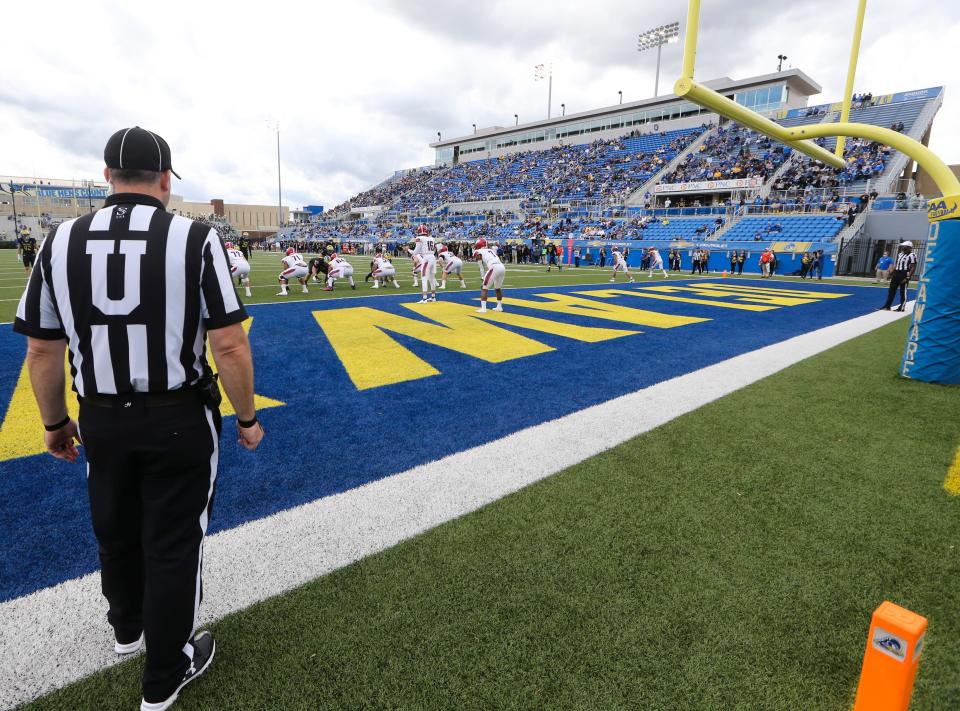
He recalled attending his first game at Delaware Stadium in 1999 to see brother Kevin Jr. play quarterback for William & Mary and being amazed at the crowd's role in the Hens' overtime win.
Delaware averaged 20,000-plus as recently as 2009 and 18,000-plus as recently as 2013, which is why Rawak says success on the field is critical in putting fans back in the seats.
“I think it’s winning,” she said. “We’re naïve to think it’s not.”
There are certainly other factors, Rawak added, pointing out that COVID-19 protocols certainly kept some people away this season.
Delaware was among the top nine nationally in I-AA/FCS attendance from 1997 through 2018, including second in 2002, 2005 and 2006. But Delaware ranked 11th nationally in 2019 and 10th in 2021, the last two seasons full capacity was permitted at Delaware Stadium.
“At the end of the day people want to come and watch teams win,” she said.
Certainly, Delaware never recovered from the disastrous levy it placed on most season-ticket purchases beginning in 2011 that Rawak eliminated after the 2016 season, her first at Delaware. The mandatory tack-on fee, which was $50 to $500 per ticket the first year but later reduced, alienated fans, including decades-long season-ticket holders who felt their loyalty was not appreciated.
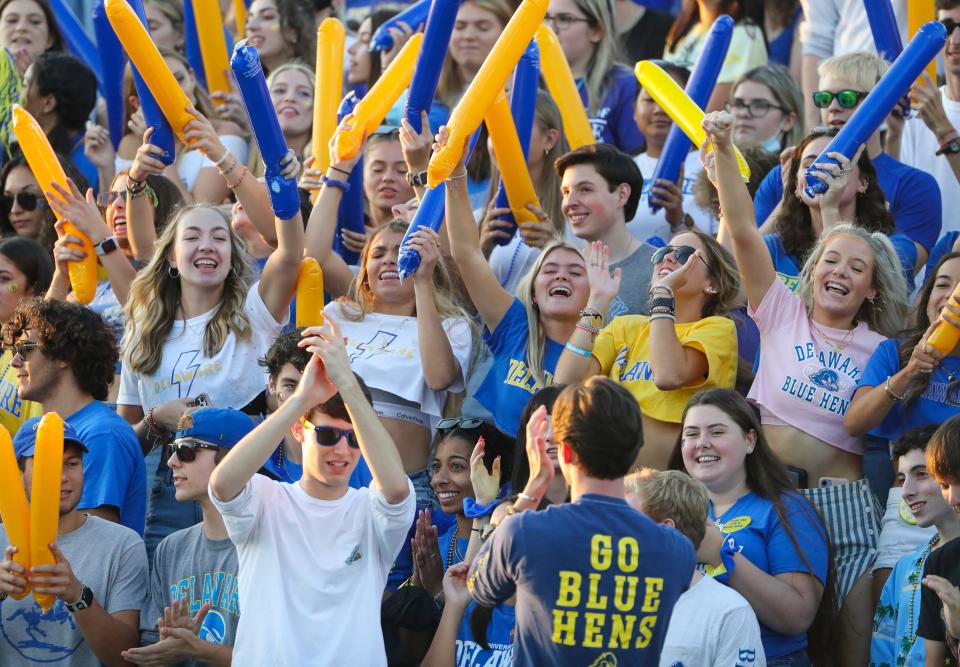
It was famously derided as an attempt at “extortion” by longtime fan Patsy Keller and “blackmail” by former Blue Hen Touchdown Club president Connie Cecil. Kunicki, who’d begun attending games in 1998, held season tickets from 2004 through 2011. After the seat fees were added, he bought season tickets intermittently or purchased tickets on a per-game basis.
Delaware’s attempt to build a newer, young audience failed to fathom, many felt, that dedicated older followers kept tickets within families, passing them down through the generations, and that’s actually where younger fans were cultivated.
In 2010, the last year before the fee, which went to the UD Athletic Fund, was instituted, Delaware sold 9,700 season tickets. By the time it was eliminated, season ticket sales were roughly 5,500 and have below that since.
With the year 2022 closing in, Blue Hens followers have become nostalgic about winning football games, witnessing them in a full Delaware Stadium and following Delaware in its pursuit for a seventh national title.
Now that Delaware has the proper foundations in terms of finances and facilities, it will hope it also now has the right coach to lead the way.
“Ryan has the UD history that’s needed,” said Kemp Vye, who has attended UD games for 21 seasons. “FCS has changed so much, with the transfers in and out and so many other things to do.’’
Carty said he was to busy with his own football teams to pay close attention to what has been ailing the Blue Hens of late.
But he pledged Monday to put them back on a winning track.
“We’re gonna make a great product,” Carty said. “We’re gonna have kids that play their butts off and we’re gonna go get some wins.’’
Get the best UD football coverage in Delaware. Sign up for Inside UD Football, a weekly newsletter from veteran reporter Kevin Tresolini.
Have an idea for a compelling local sports story or is there an issue that needs public scrutiny? Contact Kevin Tresolini at ktresolini@delawareonline.com and follow on Twitter @kevintresolini. Support local journalism by subscribing to delawareonline.com.

Kevin Tresolini
This article originally appeared on Delaware News Journal: Delaware hopes football investments, Carty hiring make winning a habit
